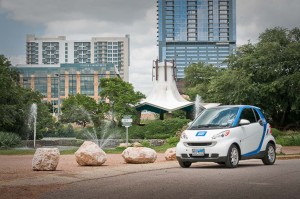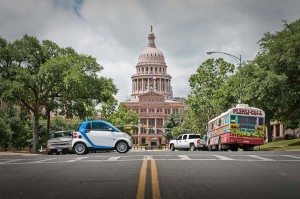Can a small car like he Smart fortwo make a big change in urban transportation? That’s what the new Daimler AG venture, car2go, is betting on.
The project, which has been operating in pilot mode for several years, is ready to roll out in full business mode, on Friday, in Austin, Texas. Company officials say they’re already looking at expansion opportunities in as many as 100 cities in North America and Europe. (See Car Sharing Meets Austin City Limits)
On the surface, car2go could be dismissed as just another way to rent a car – in this case the pint-sized Smart fortwo 2-seater. But the idea behind the venture, which first went into testing in the German city of Ulm, in 2008, is to both supplement users of mass transit and provide the occasional set of wheels for urban dwellers who might not own a vehicle of their own, company officials explained during a news conference in Austin, on Thursday.
The Texas capital has served as a test sight for the U.S. market, car2goNA partnering with the city government and signing on a small group of other residents to test the concept.

Pilot car2go programs in Austin and Ulm, Germany could soon expand to as many as 100 cities in North America and Europe.
The Daimler subsidiary has set up about 80 different parking spots around that city where registered users can pick up a vehicle, usually on demand. While some users might borrow a fortwo coupe for an extended trip, most rely on it for brief jaunts, perhaps to go shopping or to attend a business meeting. Rental fees run 35 cents a minute, $12.99 an hour or $65.99 a day. And the vehicles do not have to be returned to the same spot it was picked up from. A car2go agent will pick up the vehicle, clean it, gas it up and move it, if necessary, to another location.
“One the innovative solutions we have to have in crowded urban areas (this) will incentivize people to make greater use of mass transit,” suggested Austin Mayor Lee Leffingwell, who suggested that commuters could take a train or bus into the fast-growing city but still have access to a vehicle, if necessary.
The initial response has been solid, suggested Nicholas Cole, car2goNA’s president and CEO. Since the Austin pilot was launched, last year, over 3,000 drivers have signed up, including 1,200 Austin city employees. Rentals have been averaging about 2,000 a week. Government workers tend to rent the fortwo coupes mostly during the day, he added, while public users more often drive off during the evenings and on weekends.
In Ulm, meanwhile, 15% of the small city’s registered drivers now are signed up with car2go, and the 200 available Smart cars are, on a typical day, each used five times, according to Robert Heinrich, the venture’s global CEO, adding that as Austin gets into full operation, “We expect the same here.”
Heinrich said car2go is receiving numerous queries from around the world, and “the list of cities we’re looking at is 50 in North America and 50 in Europe.” At least some additional markets will be announced later this year, executives suggested.
Unlike a conventional rent-a-car company, car2go intends to maintain an urban base and focus on just the Smart fortwo – which is manufactured by parent Daimler AG.
“We’re not looking at larger vehicles, the German executive stressed, though when he was asked if car2go would consider offering the battery-powered version of the fortwo now undergoing its own pilot testing, he said, “The answer is a clear yes. We truly believe in the future of electric mobility.”
During the Thursday news conference, car2go was presented with the prestigious Clean Air Excellence Award, from the EPA, which the agency’s Associate Director Thomas Diggs said is presented to ventures that not only reduce pollution, but which are sustainable and demonstrate opportunities for others.
What remains to be demonstrated, however, is whether the project can make money for Daimler. “It has been a significant investment,” Heinrich conceded, “But we believe the market for innovative mobility is huge,” he added, insisting that, “The investment will pay back soon.”

